Mar 25, 2014
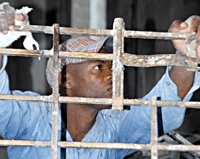
Haitian migrant worker in the Dominican Republic. Credit: Solidarity Center.
This week the Inter-American Commission on Human Rights is meeting in Washington, D.C. One of the cases the commission will hear regards the Dominican Republic’s September 2014 Constitutional Court ruling that retroactively strips individuals who are unable to prove their parents’ regular migration status of their citizenship.
A new AFL-CIO and Solidarity Center report describes what this could mean for the people who will be disproportionately affected—individuals of Haitian descent living and working in the Dominican Republic, including those born in the country.
Those targeted by the court’s ruling will be excluded from any activity that requires official identification, including working in the formal sector, attending school, opening a bank account, paying into retirement or social security funds, accessing health services, getting married, traveling or voting. For many women, men and children born in the Dominican Republic, the ruling means being barred from participating in the only society they have ever known.
In the report, Dominicans of Haitian descent describe their struggle to maintain their status, pursue higher education, seek opportunities for meaningful work and career advancement, obtain justice against abusive employers and ensure their children are recognized as citizens and have access to critical services.
This deliberate creation of a stateless underclass is an egregious abuse of fundamental human rights and a clear violation of international law.
The AFL-CIO and Solidarity Center are committed to working with their union partners in the Dominican Republic, Haiti and overseas to ensure that all workers and their families in the Dominican Republic have full protection of their human and labor rights. The organizations call on the Dominican Republic to comply with its international obligations and ensure that Dominicans of foreign descent can fully and freely participate in society.
Mar 18, 2014
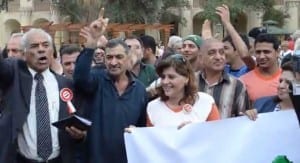
Iraqi unionists held rallies across the country urging Parliament to pass a new labor law. Credit: Wesam Chaseb
The Iraqi Parliament is currently voting on a new labor law after union members waged protests around the country in recent days urging lawmakers to act on the bill. The vote been rescheduled several times.
Six major Iraqi labor unions, together with the Solidarity Center, have worked since June 2012 to bring proposed changes to the nation’s draft labor law in line with International Labor Organization (ILO) conventions. Workers are still subject to labor laws from the Saddam Hussein era.
In a statement, Iraq union federations said that although the law under debate does not go as far as unionists sought in areas such as collective bargaining and organizing, it covers many points the Saddam-era law does not. For instance, the law would ban discrimination and forced labor and would add protections for working women and the right to strike.
The statement was signed by the General Federation of Iraqi Workers (GFIW), the Federation of Worker Councils and Unions in Iraq (FWCUI), the General Federation of Workers Unions in Iraq (GFWUI) and the Iraqi Federation of Oil Unions (IFOU).
Read the full statement in English and Arabic.
Watch a video of one of the protests.
Mar 14, 2014
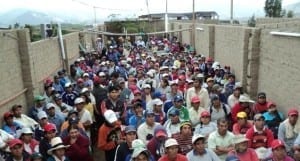
Camposol employees at a company assembly. Credit: Solidarity Center
Eighteen agricultural workers in Peru were detained during a work stoppage as they protested an agro-industrial company’s failure to uphold its collective bargaining agreement, according to the Camposol Workers’ Union (SITECASA). One union leader, Carmen Silvestre Rodríguez, was beaten by the national police, and the union’s general secretary, Felipé Arteaga, has been arrested, the union said.
SITECASA members began a peaceful work stoppage March 12 at the company’s facilities in Chao, a town in the country’s northern region. They are seeking the company’s compliance with several provisions in the region–wide collective bargaining agreement reached in July 2013, including resolution of daily production quotas for field workers, payment of annual profit sharing and provision of proper uniforms, footwear and meals for workers.
Field workers, who harvest avocados, mandarin oranges, mangoes and blueberries for export, currently must harvest 60 pallets before they receive their minimum daily wage of $11. According to the union, Camposol has conditioned its willingness to negotiate these points on the union’s retraction of an article in the collective bargaining agreement that provides employment stability (an indefinite contract) for workers with four years working for the company.
Camposol S.A. is Peru’s largest producer and exporter of non-traditional horticultural products like asparagus. Approximately 14,000 workers labor on Camposol’s vast plantations throughout the country. In 2012, the U.S. Department of State’s Human Rights Report cited Camposol for interfering with workers’ right to strike after the company failed to reinstate 250 workers dismissed for participating in a strike during collective bargaining.
Read the union’s full statement (Spanish).
Mar 11, 2014
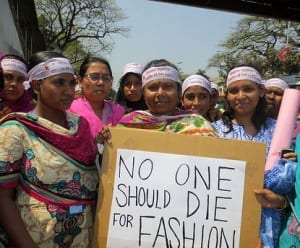
In Bangladesh, BCWS Executive Director Kalpona Akter rallied with garment workers on International Women Day. Credit: Solidarity Center
Hundreds of workers from multiple garment factories rallied in recent days at the National Press Club in Dhaka, Bangladesh, where they formed a human chain and demanded equal wages, equal rights and equal dignity for woman workers in the ready-made-garment (RMG) sector. The action was among many around the world throughout the past week as women workers and their allies commemorated International Women’s Day, held annually on March 8.
In Chittagong, where workers from 16 garment factories marched and rallied, Bangladesh Independent Garment Union Federation (BIGUF) Chittagong President Nomita pointed out that nearly all who took part were women.
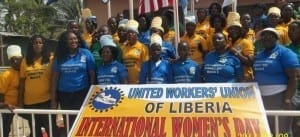
Liberian trade unionists celebrate International Women’s Day 2014. Credit: Solidarity Center
“I can’t imagine trade unions without women,” she said. Nomita urged RMG factory owners to fully implement maternity leave and establish child care centers in factories. In addition to BIGUF, other Solidarity Center allies taking part in International Women’s Day actions in the country included the Bangladesh Center for Worker Solidarity (BCWS), the Bangladesh National Garments Workers Employees League (BNGWEL), the National Garment Workers Federation (NGWF) and Sommilito Garments Sramik Federation (SGSF).
Elsewhere around the world, Solidarity Center allies marked International Women’s Day by celebrating, educating and mobilizing.
• In Tunisia, the Union Générale Tunisienne du Travail (UGTT) held a solidarity march for Palestinian women and repressed women around the world. The March 8 event took place on the main avenue in Tunis, the capital, and concluded at the UGTT center with music, cultural activities, poetry and an exhibit on the history of women’s activism in Tunisia. The event followed a roundtable on a comparative study of women’s rights in the country’s three constitutions.
• Moroccan union activists and members of the Confederation Democratique du Travail (Democratic Labor Confederation, CDT), took part in trainings that covered women’s legal rights and they also held artistic and cultural events, concluding with a ceremony honoring social activists and retired women. The Union Marocaine du Travail (Moroccan Workers’ Union, UMT) combined a celebration of Women’s Day with events marking the 59th anniversary of its founding congress. Later this month, UMT will host a roundtable discussion on the role of women in the union and strategies for broadening women’s participation in the union.
• The Border Committee of Women Workers (Comité Fronterizo de Obreras, CFO) held a mini-workshop for women participating in the Solidarity Center’s Gender and Women’s Empowerment for Action program in Coahuila, Mexico. The discussion focused on how International Women’s Day is more than a time for women to receive feel-good gestures like a flower or nice words on Facebook from the men in their lives. In Mexico, where women disproportionately bear the brunt of the country’s economic and social insecurity and violence, Women’s Day offers a space for women and girls to evaluate how far they’ve come and how much further they still must go to win equality with men and boys and achieve justice in all areas of their lives.
In Liberia, women and their allies held a parade to the United Workers Union of Liberia (UWUL) office, where they raised flags in recognition of labor partner organizations such as the United Steelworkers and IndustriAll that implement programs to help female unionists to become a strong force in Liberia.
• Across South Africa, the Solidarity Center joined with Labour for Rights for Women (LRW) campaign and the Labour Research Service (LRS) to host two events. In North West Province, the organizations convened health care workers, farm workers and domestic workers in a meeting with local civil society organizations and the South African Department of Health to discuss the impact of a new government health insurance plan, especially its impact on women workers. In Limpopo Province, the LRW held a training session for union gender coordinators, organizers and negotiators on maternity protection. The LRW, sponsored by the International Trade Union Confederation (ITUC), brings together South Africa’s labor federations to support improved respect for women’s rights at the workplace and their greater participation in union activities
Mar 10, 2014
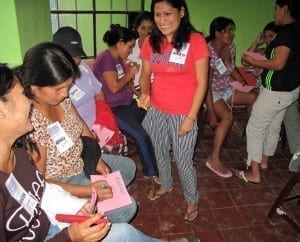
Violeta co-facilitated a workshop after learning skills from a Solidarity Center-sponsiored training. Credit: Samantha Tate
Rosa Pérez was brought to Lima, Peru, from the country’s Northern Sierra when she was a child to work as a domestic worker. As a young adult, she moved to the farming region of La Libertad to make her own way as an agricultural laborer. Thirty years, four children and five grandkids later, Perez has become a bold advocate for her co-workers. She encourages them to document and speak out about problems such as sexual harassment and inadequate safety and protection equipment and training.
Pérez, secretary of Women’s, Child and Adolescent Affairs of the Camposal Workers’ Union (Sindicato de Trabajadores de la Empresa Camposal), is a leader in a Solidarity Center program to empower women farm workers in Peru. Since 2009, the program, which includes the National Federation of Farm Workers (Federación Nacional de Trabajadores de la Agroindustria y Afines, FENTAGRO), has involved training and advocacy activities with unions representing workers in export-oriented agriculture.
The initiative gained momentum after Pérez traveled to São Paulo, Brazil, last year to participate in the Solidarity Center conference, “Women’s Empowerment, Gender Equality and Labor Rights: Transforming the Terrain.” There, she addressed more than 100 women from around the world and described working conditions for women farm workers in Peru and the actions that her union and FENTAGRO are taking to build a better life for women like her daughter, who works alongside her.
Pérez took the strategies she learned from activists at the conference to the farm worker federation’s leadership Friday, the eve of International Women’s Day. Along with the Solidarity Center, Pérez is recommending that La Libertad’s three unions meet with regional government officials and possibly employers to advocate for literacy programs targeting working women. She also plans to propose an awareness-raising campaign for men and women about sharing domestic and family care. The Solidarity Center has also been working with unions to strengthen their arguments for collective bargaining with employers in support of maternity and breastfeeding benefits that are codified in Peruvian law but not generally enforced.
Following the Women’s Empowerment conference, Perez worked with the Solidarity Center to identify 12 dynamic women from three export-oriented agriculture farms to take part in a Solidarity Center training this year geared toward building women’s confidence and strengthening their leadership skills so they can effectively advocate for women workers’ issues within their unions, their workplaces and their communities.
One of the workers who joined the training, Apolonia, is an elected officer in the Union of Agrícola Viru Workers (Sindicato de Trabajadores de la Empresa Sociedad Agrícola Virú, SITESAV). She grows and harvest fruits and vegetables as part of Peru’s export-agriculture industry, which, in 2013, generated $33 million in exports to the United States. She advises her fellow co-workers, especially young women, about how to stay healthy and build strong families while working between 12 hours and 14 hours a day and earning an average daily wage of $12.
Apolonia and other participants in the two-day training discussed how they can improve workplace safety and other issues and shared their dreams about bettering their workplaces, unions and households.
Two weeks after the leadership training, nearly all of the women who participated in the workshop, including Violeta and María Luna, who had been reluctant to speak in public, co-facilitated small workshops with groups of their peers using the new techniques they learned from the Solidarity Center training, including public speaking and one-on-one-contact to encourage self-confidence and participation.
The La Libertad network of women farm workers now has a compact disk with the stories of 32 Peruvian women leaders they can share in small study circles or at worker assemblies and when training other groups of women. It is the beginning of a much longer process that already has helped a group of powerful women to find their voice and begin to use it.






